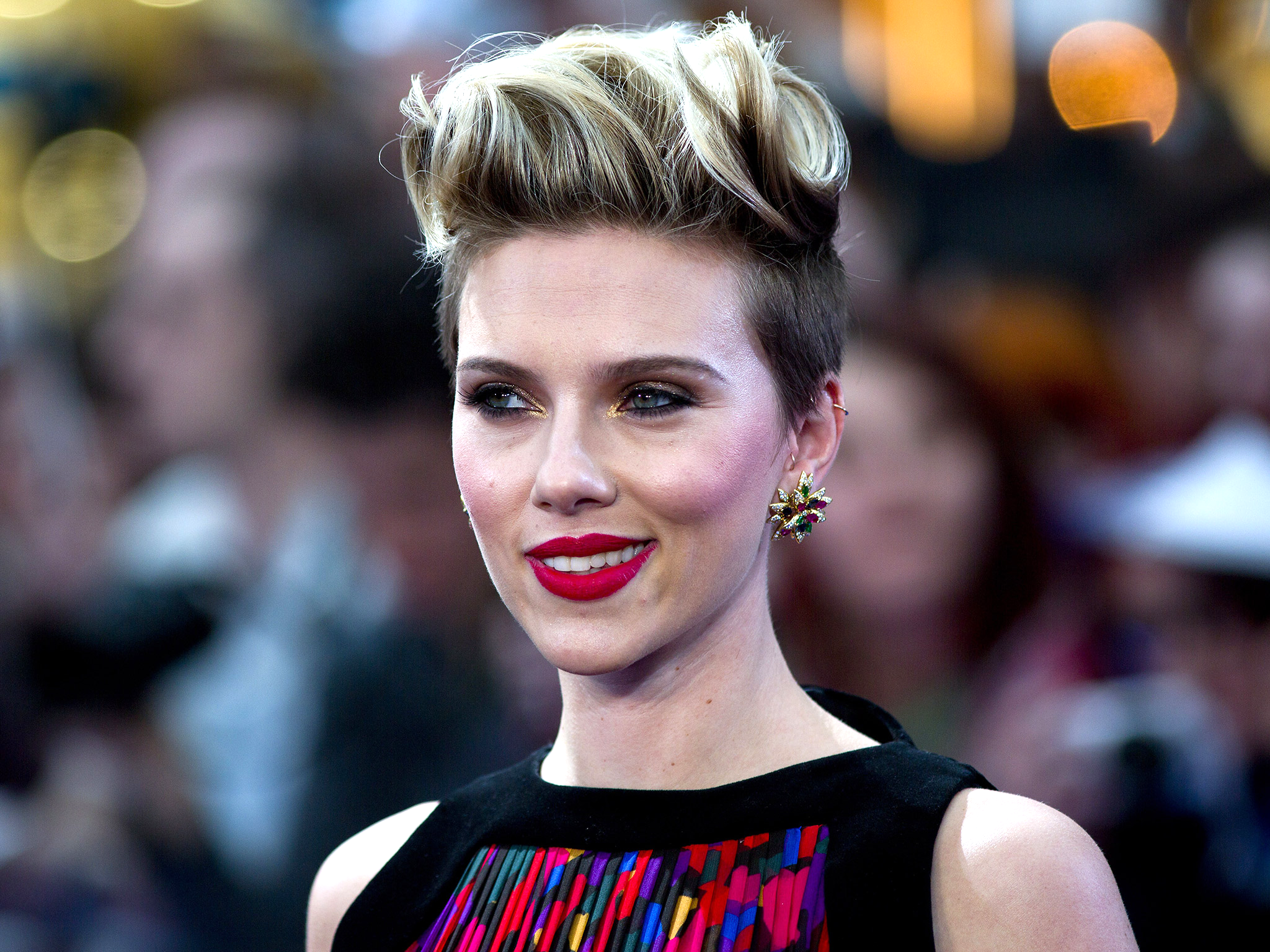Sorry, Scarlett Johansson, but there's a difference between playing a role and playing an identity
Trans people deserve to tell our own stories – and not just when we’re written, directed, designed and acted by cis people


Your support helps us to tell the story
From reproductive rights to climate change to Big Tech, The Independent is on the ground when the story is developing. Whether it's investigating the financials of Elon Musk's pro-Trump PAC or producing our latest documentary, 'The A Word', which shines a light on the American women fighting for reproductive rights, we know how important it is to parse out the facts from the messaging.
At such a critical moment in US history, we need reporters on the ground. Your donation allows us to keep sending journalists to speak to both sides of the story.
The Independent is trusted by Americans across the entire political spectrum. And unlike many other quality news outlets, we choose not to lock Americans out of our reporting and analysis with paywalls. We believe quality journalism should be available to everyone, paid for by those who can afford it.
Your support makes all the difference.It wasn’t long ago that Buffalo Bill from The Silence of the Lambs was pretty much the only mainstream transgender figure in popular culture. And I type that while cringing, because I don’t believe the character was really a mainstream transgender figure at all – more a deeply transphobic creation by a cisgender author who seemed to know nothing about trans people. It’s far from harmless to conjure up a character whose justification for murder is being trans, but that’s what this film portrayed (and won five Oscars for).
Buffalo Bill has been criticised extensively by the trans community, but there were others before him. A few years ago, we read Iain Banks’ 1984 book The Wasp Factory in my A level English Literature class. The book described in violent detail the thoughts of a child who killed both animals and other children. This character was then “revealed” as transgender in the final few chapters, as if this offered an explanation.
Looking back, the book was a contributing factor in why I dropped out of college. I was struggling with my gender identity and becoming increasingly aware of just how much society judged and criticised transgender people. The fact that a book that was so transphobic was read casually just like any other – and worse, with no criticism or even discussion of the transgender representation – in an education environment took its toll.
It’s difficult to deny that depictions like this have harmed transgender people. Just a few years ago, Buffalo Bill was pretty much the only “transgender” point of reference for straight, cisgender people. Literally the only representation of an entire community of already misunderstood people was a twisted serial killer. In a society already hostile to people living outside the ascribed confines of gender, and regardless of what was intended, this character acted to further marginalise us and make us seem like freakish and terrifying “others”.
Put simply, characters like this increase stigma, and therefore violence.
Fast-forward to the present day and it’s a positive relief that transgender people are represented on screen, page and stage in a much more varied and generally kinder way. But I can’t pretend I’m not disappointed that every time we’re given space in mainstream cinema, it’s through a cisgender actor.
The latest example is Scarlett Johansson, who has faced criticism for playing transgender man Dante “Tex” Gill in new film Rub and Tug, none of which she has seemingly taken on board.
A note here about Gill’s gender – it’s obviously always difficult reflecting on gender-variant people’s identities in the present day when they might not have had the language or access to describe their gender identity in the past. As far as the records show, Gill “preferred to be known as a man”, often insisting this, asked to be addressed as Mr Gill, and may have undergone the initial stages of medical transition.
From this it’s pretty clear to me that Gill was transgender – if not a binary transgender man, then transmasculine. Neither of which Scarlett Johansson is.
I don’t understand, then, why Johansson has been cast as Gill. A quick search on Google images will tell you it’s definitely not because of the two people’s uncanny resemblance.
The problem is – and this is an age-old argument – that transgender representation is so rare and so limited that when it does crop up, it’s important we do it right. Almost every role you could possibly think of in the history of cinema is played by a cisgender actor. The fact that, when a rare transgender casting opportunity does come up, it’s also given to a cisgender actor is a sign that casting directors don’t care about representing trans people anywhere near as much as the films they are casting for would suggest.
Trans people almost never play cis roles – so why are cis people playing trans roles? Laverne Cox has argued recently that women should play women and men should play men. Meaning that Scarlett Johansson shouldn’t play a trans man, but it would be okay if a cis man did.
I just don’t agree with this, and that’s difficult for me to say because I have so much admiration and respect for Laverne Cox. But the issue here is – although a cis man playing a trans man would be preferable to the Scarlett Johansson situation, it’s still a cis person playing a trans person. It’s still stripping that role from someone who would bring more authenticity to it – and who deserves the representation that the film claims to be bringing to the mainstream on the basis of having a trans character front and centre in the first place.
Trans people deserve to tell our own stories – and I argue this not just from an acting point of view but a writing, directing and producing perspective as well. Goodness knows we’ve been damaged by past representations. Now cis people, the gatekeepers of the mainstream, are “allowing” us space to finally tell more nuanced stories – but only if we’re written, directed, designed and acted by them. This reduces our community to “fascinating” case studies, rather than allowing us to share our stories from our own perspective.
Aside from not making any logical sense, this is damaging because our lack of representation really affects LGBTQ+ people, who are already in a minority. When you are literally the only queer or trans person you know and struggling to come to terms with your identity, finally finding a depiction of queer or trans characters in the mainstream can be a lifeline. Finally you feel seen, you feel a sense of belonging and as if you’re not alone.
Many lesbians felt this when The L Word hit our screens, however narrow a representation of the queer female experience the show was (and God knows it could and should have been better – but it was a rare string to grasp). But then looking up the actors and realising that 90 per cent of them were actually straight – that sense of feeling seen is hard to hold onto. Suddenly you’re the only queer you know again.
To those who say “playing different roles is what acting is about”, I couldn’t agree more. But there’s a difference between playing a car salesperson when you’ve never actually been one and playing a transgender person. That is, there’s a difference between playing a role and playing an identity, particularly a marginalised one.
This is true for all characters who are underrepresented in cinema – whether that’s Eddie Redmayne playing Stephen Hawking or a white man being placed front and centre in a film about the Stonewall riots, which were started by transgender and lesbian women of colour.
In 1999, Hilary Swank acted in the film Boys Don’t Cry as transgender man Brandon Teena, a character based on a real person who was brutally raped and killed by two cisgender men when they found out he was trans. I can honestly say that Hilary Swank’s acting was incredible – but I can’t justify her being cast in the role.
When we are respecting, remembering and reflecting on transphobia, it’s important not just to “involve” people who are directly affected, but actually to leave those people to have full control over what is or isn’t put out there. For cis people to come along and treat something as an “interesting acting opportunity” and then be praised for how well they depicted the struggle or the fear or the rape and murder of a trans person is frankly just offensive.
Which is why I don’t care if Scarlett Johansson gives the performance of her life playing Gill. I don’t care if it’s beautifully acted, emotional or even convincing. She shouldn’t be playing a transgender man as a cisgender woman. Her ability to act the role “well” is completely irrelevant.
Join our commenting forum
Join thought-provoking conversations, follow other Independent readers and see their replies
Comments